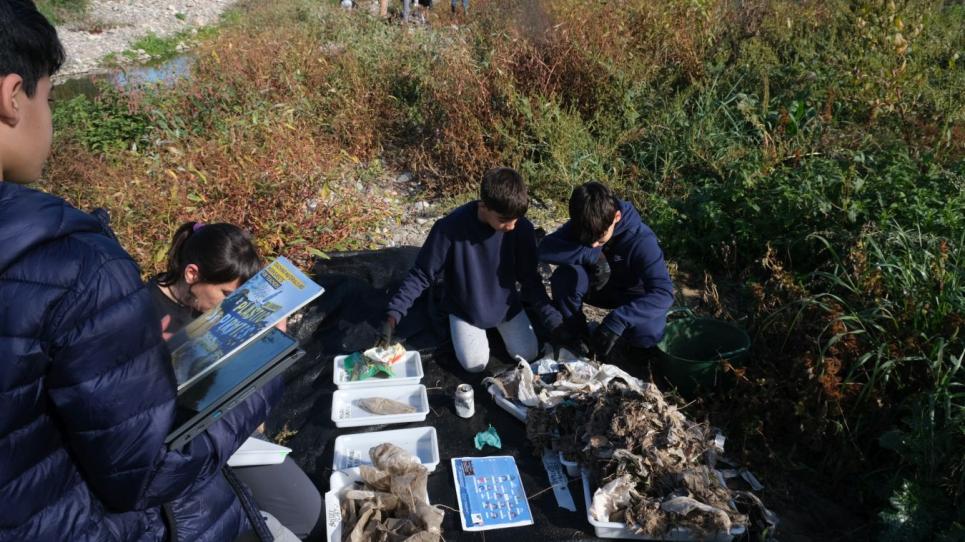Plastic packaging and disposable wipes are the most common pollutant in rivers according to the project ‘Plastic Pirates’
BETA organizes another edition of the European citizen science project ‘Plastic Pirates’, which collects the results of a year of study and concludes that plastic pollution remains stable.

This is the third year that different schools have participated in the ‘Plastic Pirates’ citizen science project, which has been studying pollutants in rivers since its implementation in 2021 and which is coordinated by our centre. This spring, around 1250 young people from 32 schools and youth associations in Spain took part, sampling different rivers in Catalonia, the Valencian Community and Castilla y León. The results of this year’s study show that, in line with previous years, packaging plastics and single-use sanitary towels are the most commonly counted waste.
The river areas with the highest number of residues are those surrounding cities and industrial areas. In Catalonia, the river Besós (Granollers) and Santa Coloma de Gramanet have been found to be the most contaminated, and in Castilla y León, in Miranda del Ebro. Plastics have been found to be the biggest pollutant, followed by paper, metal, glass, cigarettes and food. In Catalonia, legislation was adapted in 2019 to reduce the impact of certain plastic products on the environment, and therefore the trend of plastic waste in rivers is expected to decrease.
Pollution in river ecosystems, an area that need to be further studied
The BETA Technology Centre of the UVic-UCC, the University of Burgos (UBU) and the Oxígeno Foundation, with the collaboration of the Institute of Environmental Diagnosis and Water Studies – CSIC, have promoted the implementation of the same European citizen science project for young people in Catalonia, Castilla y León and País Valencià. Researchers from BETA and the University of Burgos collect and review the data obtained by the schools, and include it in the database of plastic waste at European level. The young people use specific materials such as a sampling kit and a protocol, and apply standardised scientific techniques to analyse the presence and typology of floating waste on the banks of rivers and streams.
“Year after year, waste accumulates in the seas and oceans, where it interferes with the development of marine species and the functioning of the ecosystem,” explains Meritxell Abril, a researcher at the BETA Technology Centre and member of the Plastic Pirates project in Spain. Abril explains that, for example, “several studies have shown that plastic bags can be deadly traps for birds and sea turtles”. Plastic pollution has been extensively studied in marine ecosystems, but little in river ecosystems. There are few studies on the presence of plastic waste in rivers, and the role of these in their transport to the sea. Therefore, this project not only contributes to research on plastic waste in European rivers, but also teaches young people how to use the scientific method and raise awareness of this environmental problem.
“Through this citizen science project, young people, the driving force of change, become aware of this problem, raise awareness of their immediate environment and, in addition, play an active role together with the scientific community by generating scientific knowledge that helps to solve it”, say Patricia De La Fuente and Antonio Canepa, researchers at the UBU and members of the Plastic Pirates project in Spain.
The Plastic Pirates project was born in Germany in 2016 and is focused on groups of young people from different schools, associations, and groups throughout Europe. In addition to Spain, Austria, Belgium, Bulgaria, France, Germany, Greece, Hungary, Holland, Italy, Lithuania, Portugal, Slovakia and Austria, it is one of the largest citizen science networks aimed at young people in existence today. This project receives funding from the European Commission – Horizon Europe – within the scope of the “Mission: Restoring our oceans and waters by 2030” and has the collaboration of the Spanish Foundation for Science and Technology (FECYT) – Ministry of Science, Innovation and Universities.
